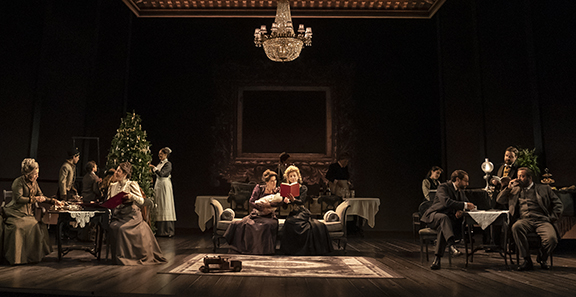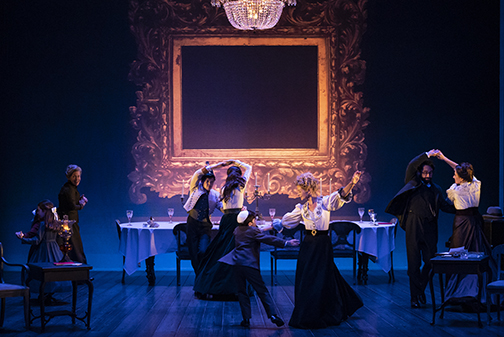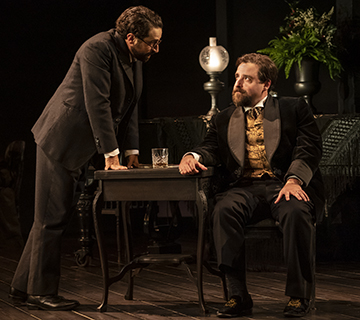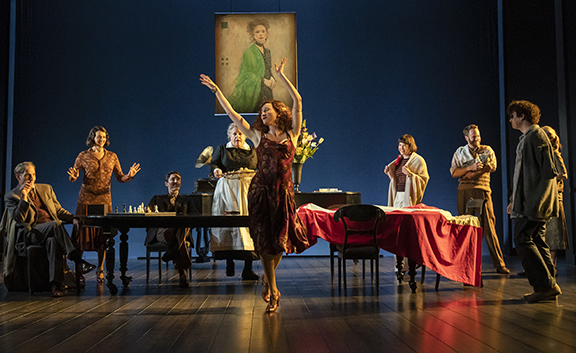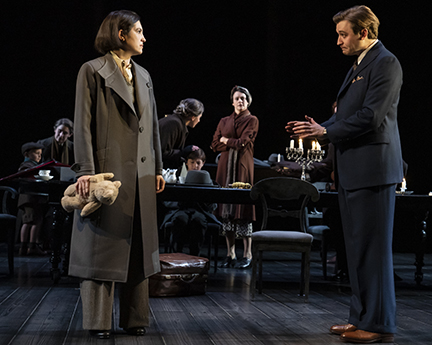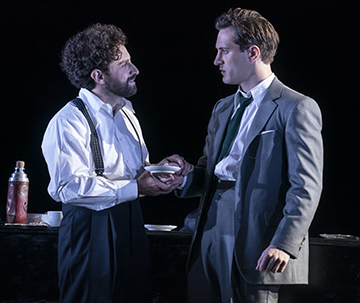By Lucy Komisar
Tom Stoppard’s brilliant play is about the self-delusion of upper-class Jews who thought their absorption into Austrian culture meant that in spite of years of anti-Semitism and rising Nazism they would not be in danger. Austrian Socialists and Social Democrats joined the Nazi rallies. The “Collective West,” including Roosevelt, refused to take in more than a handful of Jewish refugees and left millions to perish.
Stoppard found his Jewish history only 30 years ago at age 56. All four of his grandparents and three of his mother’s sisters were killed by the Nazis. The play is how he imagines his family, who lived in Prague, were murdered in the Holocaust, except for his parents who fled with him first to Shanghai. He chooses Vienna rather than Prague as that was a European center of culture and became a center of fascism as much as Berlin.
This is about sophisticated Jews, one married to a rich gentile manufacturer (except gentile is not quite what it seems), who argue with people in the family who looked to Herzl’s vision of a Jewish state.
The story is carried through with cinematic direction by Patrick Marber with lush period settings (by Richard Hudson) and costumes (by Brigitte Rieffenstuel) that pull you into another world. The performances are superb. I therefore don’t focus here on the actors, who are all exceptional, but on the narrative.
1899 Vienna
It starts with the irony of a boy putting a Jewish star on a Christmas tree. Grandma (Betsy Aidem): “We only have a tree for you little Papists.” (But Ernst is Protestant) “Protestant or Papist, it’s still about a nice Jewish boy with ideas about himself.” It’s an upper-class family gathering with cross-conversations and movement.
But they had their own traditions.
Ludwig (Brandon Uranowitz), a mathematician, thinks about leaving. Hermann (David Krumholtz), who owns a textile mill, asks, “Do you want to do mathematics in the desert or in the city where Haydn, Mozart and Beethoven overlapped, and Brahms used to come to our house? We’re Austrians. Viennese! … A city of art lovers and intellectuals like no other.” He noted, “Obviously prejudice doesn’t disappear overnight.”
Ludwig says, “No. That must be why the police stand around watching Jewish students get thrown down the University ramp, before arresting them for causing a disturbance.”
Stoppard relives the conflicts over the situation and safety of the Jews in Austria as did that family, mirroring the larger Jewish society, asking and answering the question of why they didn’t flee.
Hermann: “But fifty years ago you couldn’t get a foot in. … And if you lived in Vienna you lived in Leopoldstadt,” the Jewish quarter. He says being at the heart of Viennese culture is “the promised land. …We’re the torchbearers of assimilation.”
Ludwig reminds him that, “the only welcome Theodore Herzl’s little book received was in the anti-Semitic press. ‘A state for the Jews? Good idea! Get them out of here!’ The middle-class Jews were offended by Zionism. “But when your sister and I visited my family, everywhere we went I was asked about Herzl; this book was going around like a fever. These are people whose parents arrived with their parents running for their lives from the Cossacks, and mentally they’re living with their bags packed.”
1900
Hermann’s grandfather was a peddler. His son had a tailor’s shop in Leopoldstadt. His father imported the first steam-driven loom from America. And his father had him baptized Catholic. Challenged on that, he quips, “They were Jews; they knew a bargain when they saw it.”
1924 Age of the Charleston
Hanna is accompanying a lieder recital at the Salzburg Festival. Aaron (Jesse Aaronson), son-in-law of Ludwig, comments, “She’ll be the only Jew in the house. Kurt (Daniel Cantor), married to Hanna: “You’re talking nonsense. Salzburg is full of Jews during the festival, only they call themselves Social Democrats.” Jacob (Seth Numrich), son of Hermann, reminds him, “The Christian Social party lives on, a coalition of anti-Semites, with a Catholic priest as Chancellor, and every one a music lover!”
It’s all about denial.
Jacob: “As perpetual outsiders the Jews had no place at the table except to be the bank. If they’d had a country like most people, they would have developed a society with a proper class structure. To Nellie (Tedra Millan), Ludwig’s daughter: “Given time, instead of having to join other people’s revolutions you could rebel against your own ruling class. This could be a good time to start the whole thing off. Thanks to Russian pogroms and a Rothschild.”
Nellie has the clearest head of the group, and she is with the workers. “There’s no flag any more for the ground where we stood; we liberal bourgeois Jews. It’s the red flag or the standard of the old guard with fascism only a step away. Not even a step.”
Jacob: “Well, wave your red flag, the Jews will get blamed anyway – strikes, inflation, bank failures, bolshevism, the black market, modern art… War was going to make Jews Austrian once and for all, not just the assimilated, the baptized, the mischlings, but even the refugees pouring in from Galicia and the Eastern Front. War fever made us all patriots. We offered up our lives to the Emperor…. Now a Jew would have a chance to rise in the regiment.”
1938 The final challenge
Percy (Seth Numrich) is a new character, of another world. He is an English journalist. He remarks, “President Roosevelt’s invitation to the countries taking part in talks about refugees was at pains to make it understood that no country would be expected or asked to take in more Jews than was permitted under its existing legislation. So, they weren’t and they didn’t.” He said, “The conference met to do nothing and concluded that there was nothing to be done; so it was a success.”
As Ernst declared, “Barbarism will not be eradicated by culture.”
Almost losing his temper, Percy declares, “Burckel isn’t Chancellor, he’s the Reichskommissar of a province of the Third Reich formerly known as Republic Austria! – and now that’s gone after only twenty years. What were you doing before German bombers flew over like an overture to Hitler’s triumphant entrance into Vienna?”
Nellie: “Do you mean us Jews?”
Percy: “No! You Socialists and Social Democrats! – When the Christian Socialists got rid of parliament and invented Austrian fascism! Well, it wasn’t enough to keep Hitler out! (more calmly). Forgive me. When the paper sent me here, the man from the Times said, “Percy, let’s go to Graz, there’s an NSP march.” I said, “I thought the Nats were illegal here.” “Oh, they are!” So we went to Graz and saw twenty thousand National Socialists with swastika buttons marching through Graz, watched by delirious crowds and a few policemen. I said, “Douglas, what are the Austrians doing about this?” “These are the Austrians,” he said.”
The knock on the door came on Kristallnacht. It is a horrific moment…A Nazi and two police arrive to harass, berate and threaten them and tell them they must leave the next day. With no little irony, the Nazi makes Hermann sign over his factory. German correctness?
The postscript is 1955.
Nathan Fishbein is on the math faculty at the University of Vienna. He talks to a visitor, Leo (Arty Froushan), the son of Nellie and Aaron, who got out to England, but would die in the war.
Leo is a stand-in for Stoppard, who has talked about how happy he was to be English. Leo says, “My mother didn’t want me to go to school with a German name. I was Leonard Chamberlain from when I was eight. She never talked about her family in Vienna. She didn’t want me to have Jewish relatives in case Hitler won. She wanted me to be an English boy. I didn’t mind. I was pleased.”
Recounting the chronicle of his “family,” Stoppard is Jewish again. This is a stunning play, moved powerfully to its inexorable conclusion by director Marber, who is also Jewish, as if it were a sorrowful Kaddish for those who perished.
“Leopoldstadt.” Written by Tom Stoppard, directed by Patrick Marber. Longacre Theatre, 220 West 48th Street, NYC. Runtime 2:10hrs, no intermission. 212-239-6200 or 800-447-7400. Opened Oct 2, 2022. Masks optional. Review on New York Theatre-Wire.


